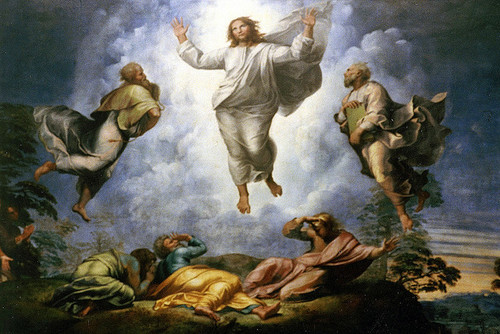February 17, 2008
Matthew 17:1-9
It is a scientific fact that the average person blinks twenty five times every minute. It is also scientifically verifiable that the average blink lasts one fifth of a second. What this means is that if you were to take a ten-hour automobile trip, driving at fifty miles per hour, you would drive fifty miles of that trip with your eyes closed. (Now aren’t you glad you came today? Where else can you get this kind of information?) But hidden in that scientific statistic is an important truth about life. In life we see certain things very clearly, but there are also other things, which we do not see, things to which our eyes are shut. And much like the experience of blinking, we are largely unaware of the things to which are eyes are closed.
Now this is what makes the transfiguration in today’s gospel so important for the disciples. They thought they knew Jesus. They walked with him. They ate with him. They saw him heal. They heard him preach. Yet they were largely unaware of how much of Jesus they did not see. In the transfiguration, they receive a glimpse of Jesus’ glory, a flash of his brilliance which normally they did not see. In the transfiguration, they were confronted with the mystery of Jesus’ death and resurrection which they had not begun to anticipate. The transfiguration told the disciples that Jesus was more than they had ever imagined, that as much as they knew about him, there was even more that they did not know.
This experience of the transfiguration provides us with a model of discipleship. In our our lives, we must claim the things that we can see, the things that are visible. But at the same time, we must remember that there are many things that we do not see. The model for discipleship is then a combination of wisdom and humility: of wisdom to know what is visible, of humility to remember that there is even more that we do not understand.
Parents need this model. They are charged to share what they see, their wisdom, with their children. They are charged to warn their children about what they feel is harmful and to guide them to the decisions which they see as the best decisions. But even as they exercise that wisdom for the sake of their children, parents must remember that there is a part of every child which they do not see, a part that is only now emerging. Parents must respect that part which they cannot see. It is the only way in which their children will grow to be the persons God wants them to be.
You and I must use this model of discipleship every time we interact with people who are different than us, people of a different race, nationality, or sexual orientation. There are things about all of all people which we can clearly see. But we must also remember that there are parts of every person which we do not see. It is only by humbly remembering what we do not see that we can enter into honest dialogue and deeper understanding.
We must be attentive to this model as we deal with people of different faith traditions. As Christians, we proudly claim that Jesus is the way to salvation. Even as we assert that truth, we must at the same time, realize that God is working in the lives of other people in ways which we cannot see. God is active in the lives of Jews, Muslims, Hindus, and Buddhists. Their way to God is something we cannot understand because it is not our way. Yet we must respect their witness of faith.
This model of discipleship lastly is crucial as we deal with the reality of evil in our lives. As followers of Christ, we believe that all good gifts come from God. So whenever we are blessed in any way, we rightly claim that this is a sign of God caring and loving us. But when we experience evil in our life, we must humbly admit that we do not understand its presence. We cannot explain why the innocent suffer, why millions of people die from disease and natural disasters. We do not understand, we cannot see the reason or the meaning of evil. It is better to claim that we do not see, than to adopt explanations that warp the goodness and love of God for us.
A disciple of Jesus is called to follow him in wisdom and in humility: in the wisdom which claims the truth we can see, in the humility which admits that there are other truths that we cannot see. Both wisdom and humility are necessary. Not to claim the truth which we can see is foolish. Not to admit that there is the truth which we cannot see is bigotry. The follower of Christ strives to be neither a fool nor a bigot. We try to be both wise and humble. We remember that we blink. With God’s help we can trust that in time we will come to see the light to which now our eyes are closed.

